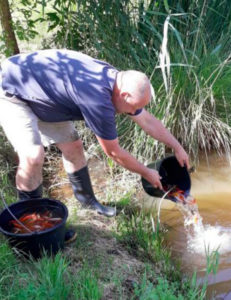
As Dr. Ian Malcom said in Jurassic Park, “Life, uh, finds a way.”
In the massive water-recirculation basins at a wash rack located on Rhine Ordnance Barracks, thousands of goldfish swimming around proved Dr. Malcom correct July 21.
U.S. Army Garrison Rheinland-Pfalz employees from the Directorate of Public Works discovered the massive schools of fish during routine cleaning. The basins are deep-cleaned every five years.
At the wash rack, Soldiers regularly scrub military vehicles using the water from the basins, filtered, recirculated, and used again. The build-up of sludge — contaminated with oil and lubricants — and other materials precipitates the five-year deep-cleaning and led to the discovery of the fish.
“It was a surprise to see so many fish,” said Heinz Werner Rudolf, chief of DPW’s operations and maintenance division. “The fish should not be living and swimming in there at all, and that’s the problem. People need to understand not to dump anything into these basins.”
Garrison environmental engineer Dr. Claudia Weber talked about the danger to the fish. “Even if it does not look like it at the first glance, the basins at the wash rack provide a very dangerous and torturing environment for goldfish. The contaminated sludge is putting the fish’s health at risk, and if the operating rotating pump blades strike a fish or squeeze them, that will cause a slow suffocation and death.”
Greg Williams, director of DPW, agreed. “This is a recurring problem we run into each time the basins are deep cleaned and is completely avoidable. We need folks not to dump anything into the water basins. Doing that creates problems and could impair the mission effectiveness of that facility.”
The removal of the fish is part and parcel of the garrison’s Integrated Pest Management Program. The program helps sustain infrastructure used for training, working, and living by providing professional guidance to reduce or eliminate impact from all plant, insect, fungus, and vertebrate pests on Soldiers and their families.
No one’s quite sure how the fish got into the water; however, officials suspect former Soldiers living in the barracks across the street — who may keep the fish as pets — dumped them before moving away. The fish eventually breed and start crowding the basin.
The “Thar Be Whales!” moment for DPW workers turned into an opportunity for them to relocate the fish without harming them. To rescue the fish, workers first drained the basins one at a time. Lutz Andres, from DPW’s pest management, and Konstantin “Konnie” Gross, from the environmental team, then scooped the fish out with pool-cleaning nets and dumped them into drums filled with clean water.
The process took about three hours. Routine repairs ensured the wash rack stayed idle as Gross and Andres undertook the rescue effort.
“Since the release of these goldfish in natural waterbodies will negatively impact the natural ecosystem of those waterbodies, a new home had to be found,” Dr. Weber said. So, Gross and Andres hauled the drums to a nearby artificial pond donated by a local community member. They then released the fish, where life continued to, uh, find a way without doing harm to the natural habitats and native species.
Dr. Weber stressed the need for people to relocate pets and not abandon them, even fish. “Please think of the future of your flaky, furry or feathery comrades,” she said. “Be on the look out to find friends to take it over as shops or kennels will rarely accept your pet.” She added that pest management’s Andres can also help to find the pet a home.
DPW chief Williams said all’s well that ends well for the goldfish.


